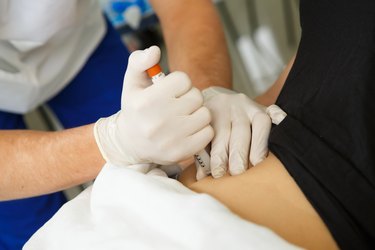
Human chorionic gonadotropin, or HCG, is a hormone naturally produced by the placenta in pregnant women. According to the HCG Diet Info website, it alerts the hypothalamus, the area of the brain that affects metabolism, to mobilize fat stores. When a woman is pregnant, this helps her body get nutrients into the placenta, providing the fetus with energy to grow. The HCG diet combines daily injections of this hormone with a low calorie diet.
History
Video of the Day
In 1967, British physician Albert T. Simeons founded a weight-loss program that used HCG to treat obesity. Simeons found that HCG uses the body's own fat reserves to provide nutrition, through the placenta, to a fetus that is otherwise not receiving food. He then theorized that a small amount given daily in people who have overweight and obesity and who are not pregnant may assist in weight loss. By the 1970s, HCG was widely used throughout United States. Some doctors liked it because it guaranteed them a steady business -- patients would visit the office once a week for their injection. However, in 1975, the Food and Drug Administration required all advertising of this product to include a disclaimer saying the product has not been proven effective. In 2008, it was added to Major League Baseball's list of banned substances, and in 2009, the American Society of Bariatric Physicians released a statement denouncing the diet.
Video of the Day
Features
On the HCG diet, you either give yourself shots of HCG or take HCG supplements. When following this diet, you severely restrict the number of calories you eat every day, usually just 500 to 800 -- less than one-half of the recommended level. The diet is usually offered at weight-loss clinics that offer medical supervision.
Weight Loss claims
According to the HGC Diet Info website, people who follow this plan can expect to lose between 0.5 and 3 lb. a day. One pound is usually lost in the first day. Increasing vegetable consumption and fiber intake will help speed weight loss, the website claims.
Side effects
If you are eating too few calories, you will most likely not be able to meet all of your nutritional needs, putting you at risk for other health problems. Additionally, too-fast weight loss can lead to gallstones. The HCG hormone itself also has side effects, including headache, depression, irritability, fatigue and male breast enlargement.
Warning
The HCG diet has not been approved by the FDA, so consult your doctor before beginning this or any other weight loss plan. Additionally, be wary of buying HCG supplies through the Internet because you cannot guarantee their safety. If you do decide to follow this diet, be aware that once you stop taking the injections and increasing your calorie intake, even to a more "normal" level, you most likely regain any weight you lost, according to MayoClinic.com.